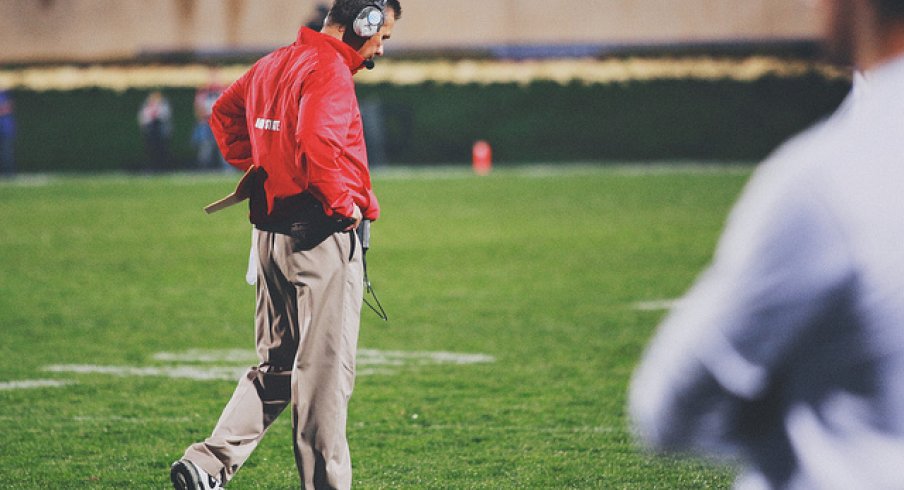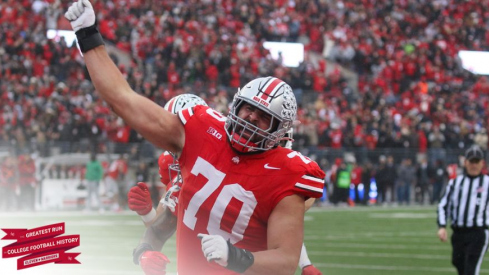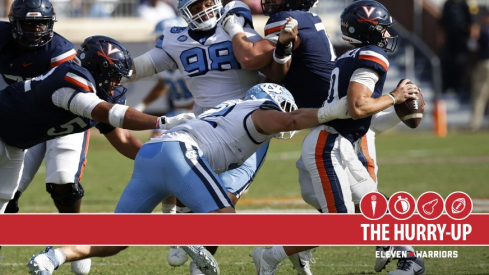“You live in a cubbyhole, drive to work, and sit in dark rooms all day long,” is one way Urban Meyer likes to playfully deflect and plead ignorance to questions that aren't about football.
Ask Meyer about something larger than Xs and Os — something other than fly routes, routes, gap schemes or the spread option — and he’ll say he’s just a college football coach whose life just revolves around sitting in front of projector screens and just toiling away studying opposing defenses for hours and hours.
In the more than two years since Meyer took over Ohio State, lines like that are almost reflexive. For whatever the reason — and there’s probably a lot of them — Meyer's never seemed quite comfortable talking about the sport's big picture.
Last season, when his Buckeyes were on the cusp of notching the longest winning streak in school history, he circumvented questions about the historical significance of the moment by reiterating how he needed to push his punt return team to block better.
At the team’s Media Day this August, Meyer ducked talking about the NCAA’s grant of autonomy to the Power Five conferences, and how a federal court ruled student-athletes ought to share a piece of the billion-dollars generated industry by admitting he hadn't paid enough attention to said current events to appropriately answer questions about them.
But this time, when Meyer got asked to offer his take on the major off-field problems affecting the sport he's spent the better part of his life slaving over, he didn’t wince. He didn’t dance around the topic, he just answered the questions. He was insightful. He was open. He was honest.
“I go work out and put on the (television) and I noticed today every one of (the shows) — for I want to say 20-30 minutes — was issues,” Meyer said after practice Wednesday evening.
Issues like the NFL’s recent handling of off-field incidents such as those involving former Baltimore Ravens running back Ray Rice (who knocked out his then-fiancee in an elevator), Carolina Panthers defensive end Greg Hardy (who was found guilty of assaulting and threatening his ex-girlfriend in July), San Francisco 49ers defensive tackle Ray McDonald (who was arrested for domestic violence Aug. 31), Arizona Cardinals running back Jonathan Dwyer (who allegedly head-butted/punched his wife and threw a shoe at his infant son ) and star Minnesota Vikings running back Adrian Peterson, who was indicted on charges of child abuse for disciplining his son with a tree branch.
You know, issues. Sometimes, we call them distractions (even though, ironically, the seriousness of the matters means they should be the center of attention). In the end, you can just call them problems.
“Not just the NFL,” Meyer said. “College (too).”
Like how Florida State quarterback and Heisman Trophy winner Jameis Winston, who was at the center of a rape investigation that may or may not have been botched by the school and Tallahassee authorities last year, hopped up on a table in the Student Union and screamed offensive (but mostly stupid) obscenities. You can read about it here. Or here. And here, too.
Because the bad headlines about football players doing bad things seem to be just everywhere all the time.
Meyer’s aware of them, and so are his players.
“How do you not see it?” he said.
So why tiptoe around something that’s so obvious: the sport’s going through an image crisis whether it’s domestic violence, concussions, drugs, or how you properly compensate college players within an antiquated model of amateurism. The NFL's string of off-field violence is the latest chapter.
“They’re all teachable moments,” Meyer said. “I think everybody in the country’s used that.” That, of course, includes Ohio State.
This wall in the Woody Hayes Athletic Center outlines the team's “core values:"
Here is Ohio State's "be the best man" doctrine.. #OhioState #CompleteMan pic.twitter.com/XJUXICTYef
— George Whitfield Jr. (@georgewhitfield) June 17, 2013
Kind of obvious standards to live by, right?
"It’s a little bit of common sense, but at the same time it’s always good to remind yourself," senior wide receiver Evan Spencer said. "It’s just a reminder every time that we leave the Woody that you have to represent something: one for yourself and two, something that’s bigger than yourself. You represent this university, you represent this team and more importantly you represent your family.”
That holds true in good times and bad.
"We are football players," Spencer said, "but we are human at the same time."
Fans forget that reality, and, apparently, so do players. Being a football player makes you neither infallible to error nor invincible to the consequences that affect everyone else.
"With or without a camera in front of you, you should always try to live your life right and do the right things," sophomore safety Tyvis Powell said. "People just, I guess, the fame might be getting to them and they might get caught up in the fame and stuff like that and forget about who they are and what they’re trying to do with their life."
College is a good time to learn that lesson — even if it takes a no-brainer sign to serve as a reminder.


